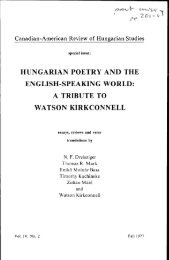HUNGARIAN STUDIES 11. No. 1. Nemzetközi Magyar ... - EPA
HUNGARIAN STUDIES 11. No. 1. Nemzetközi Magyar ... - EPA
HUNGARIAN STUDIES 11. No. 1. Nemzetközi Magyar ... - EPA
- No tags were found...
You also want an ePaper? Increase the reach of your titles
YUMPU automatically turns print PDFs into web optimized ePapers that Google loves.
NATIONAL AND INTERNATIONAL IMPLICATIONS 21characteristic example of this ambiguity. The title refers to the pieces of thesection supplementing the psalms in the official song-books of the HungarianReformed Church, but the closure is in conflict with the archaic stylecharacteristic of Protestant songs:Ha meghalsz, meghalok; porainkbólegyszerre sodor majd forgó tornyot a szél.The verbal economy is new in Radnóti's verse and dependent upon thegrammar of a non-Indoeuropean language. Accordingly, the degree of translatabilityis rather low. The first three words make two ways of readingpossible: "If you die, I shall also die" and "If you and I perish." <strong>No</strong> lesscompressed is the meaning of the next sentence: "our ashes are suddenly,simultaneously and violently transformed - literally 'twisted' - into a tower orspire that is turned around by the wind." The emphasis is on an adverbsuggesting temporality and modality ("egyszerre") that is lost in the Englishtranslation:When you die, I'll die; out of our dust the windwill twirl a single spinning tower.Experimentation with imagery and intertextuality was continued in SteepRoad (1938). Once again, if the original poems are read side by side with theEnglish versions, it is difficult not to observe that not all of the complexity ispreserved in translation. Here is the crucial passage of the First Eclogue (1938)as rendered by Emery George:Still, I write, and I live in the midst of this mad-dog world, aslives that oak: it knows they'll be cutting it down; that white crosson it signals: tomorrow the tree men will buzz-saw the region;calmly it waits for that fate, yet it sprouts new leaves in the meantime.In a few cases the English text is somewhat mannered: for the adjective"kerge" - usually associated with "sheep" - the compound "mad-dog" issubstituted. In the version by Emery George the original understatement isreplaced by an exaggeration; in the other translations the solution is even lesssatisfactory, because the allusion to the world of animals is missing from sachwords as "insanity," "frenzied," or "crazy." On other occasions the grammaticalvalue of the English word is too weak: the rhetorical strength of the verb"fehérlik" is absent not only from the simple adjective "white" used by George
















